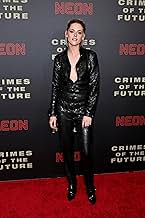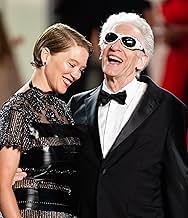Os humanos se adaptam a um ambiente sintético, com novas transformações e mutações. Com a ajuda de Caprice, Saul Tenser, artista performático de celebridades, mostra publicamente a metamorfo... Ler tudoOs humanos se adaptam a um ambiente sintético, com novas transformações e mutações. Com a ajuda de Caprice, Saul Tenser, artista performático de celebridades, mostra publicamente a metamorfose de seus órgãos em atuações de vanguarda.Os humanos se adaptam a um ambiente sintético, com novas transformações e mutações. Com a ajuda de Caprice, Saul Tenser, artista performático de celebridades, mostra publicamente a metamorfose de seus órgãos em atuações de vanguarda.
- Prêmios
- 14 vitórias e 38 indicações no total
Ephie Kantza
- Adrienne Berceau
- (as Efi Kantza)
Alexandra Anger
- Surgeon
- (não creditado)
Avaliações em destaque
This flick is off the wall even for Cronenberg. And I'm amazed that such well known actors made this dark and almost plotless film.
It opens withan outrage and ends with a whimper. The dialogue is vague and depressing as is the premise that future art will be of pain and suffering.
It opens withan outrage and ends with a whimper. The dialogue is vague and depressing as is the premise that future art will be of pain and suffering.
This movie starts out great, with an awesomely dark opening scene to set the mood. It's really weird immediately and reaches high levels of grossness, but I surprisingly dug it. In many movies set in the future, it really isn't much different except for the technology and a few aesthetics. But here, we see a really interesting depiction of where humanity ends up, some of which I find scarily possible.
Unfortunately, it's extremely dull with just the slightest hint of a story and doesn't amount to anything. By the end I was checked out, or else I might've been furious at how it ends. I think many people will think this is one of the worst movies they've seen. (1 viewing, 6/8/2022)
Unfortunately, it's extremely dull with just the slightest hint of a story and doesn't amount to anything. By the end I was checked out, or else I might've been furious at how it ends. I think many people will think this is one of the worst movies they've seen. (1 viewing, 6/8/2022)
As another 21st century art object, not a "movie" which is an early 20th century concept, this delivers everything the brand name (David Cronenberg) promises. Plus it's pretty high-brow. Superior production values but I really think it'a more of a moving painting. When everyone has 4K video projection it could play silently on a wall, slowly changing from pale, wan faces to exotic biomorphics to visceral, pulsating fantasias. If you want date night (unless your date is Amy Taubin) forget it.
I just remembered what this kinda, sorta reminded me of. Quintet, Robert Altman's arty, dystopic from 1979. That wintry society was pre-occupied with the stylized rituals of the titular board game. And everyone was cloaked and draped against the cold with hats and hoods. Similar end-of-world feel.
I just remembered what this kinda, sorta reminded me of. Quintet, Robert Altman's arty, dystopic from 1979. That wintry society was pre-occupied with the stylized rituals of the titular board game. And everyone was cloaked and draped against the cold with hats and hoods. Similar end-of-world feel.
My thoughts on "Crimes" is more of a deep-dive into the metaphorical meanings within Cronenberg's on-the-nose, satirical (albeit horrific) and sometimes humorous view of modern-day technology (ex: eating chair, sleeping bed, autopsy bed), exhibitionism and voyeurism (ex: Saul, Caprice, Timlin, two women with drills), pop culture (ex: Klinik/Ear Man, others), celebrity status (Saul and Caprice), and ultimately the "plastic" society that we have become (ex: plastic eaters, non-plastic eaters, and those "evolving" into eating plastic. There are also the "policing agencies" (Cope, Wippet, Timlin) that tries to regulate and/or terminate humanities permanent decline into a meaningless existence of seeking out ever-greater, "shocking" sensualities (ex: government's attempts to regulate social media and the moral decline of society).
The story clearly identifies "plastic" as the synthetic, cheap, easily consumed and digested content in social media (I think of "Barbie Girl" by Aqua, Madonna's "Material Girl"). Each of the main characters is participating in the so-called "art" in some way with a brief glimpse of a "normal person" who dies from eating "plastic".
The boy Brecken, from the outset, has already "evolved" into a full plastic eater. The mother, representing parents of young "social media artists" today, smothers him. This represents the consequences of parents allowing their children to consume and produce cheap, easy to consume exhibitionism eventually leading them to be killed by it (ex: kids being killed by their stalkers, older men being fans of young girls) as if the parent was the actual murderer.
Through the entire story, the main character Saul resists "evolving" into a plastic eater (ex: "tumor-like organs" that grow inside him = the cancers of society) using alien-looking tech just to eat and sleep (Ex: cpap, hospital surgical devices, feeding tubes, mechanised beds etc). Finally, after just giving in to "evolving" into a plastic eater does he find complete contentment and peace. However, never does he realize that his "painless" exhibitionism is the very cause of his morphing into a plastic eater; he's now desensitised to it all.
Along the way, we also meet two woman voyeurists who drill holes into people's heads representing the mindless, intellegence draining people of YouTube Channels and pornography; they create content that displays to everyone their so-called "inner beauty" but is secretely "horrific" for us to watch, and we can't turn our eyes away (ex: Adrienne, Ear Man, zipper device, etc.). In addition, Ear Man (Klinik) demonstrates how even the hippocritical Producer of his "Art" (ex: the music and entertainment industry) can be the very one who exploits the financial successes but joins the "popular" view of hating it (ex: anonymous likes, dislikes, etc.).
There are many more metaphorical references throughout the story and Cronenberg uses the genre as a warning of the future "horrors" of becoming "Plastic Eaters". Cronenberg asks us If we are disgusted by what we are watching and thus why are we not disgusted by what we "consume" in today's media? He suggests that if we are not disgusted by what we're watching, we're already a plastic eater. Indeed, ultimately society will become senseless, meaningless, painless, completely devoid of the characteristics that make us human if we don't stop eating plastic both metaphorically (ex: social media, empty entertainment, exhibitionism, voyeurism, pop culture, celebrity status, etc.) and physically (ex: oceans being full of plastic-fish eat it, we eat the fish). Neither has any nutritional value.
The story clearly identifies "plastic" as the synthetic, cheap, easily consumed and digested content in social media (I think of "Barbie Girl" by Aqua, Madonna's "Material Girl"). Each of the main characters is participating in the so-called "art" in some way with a brief glimpse of a "normal person" who dies from eating "plastic".
The boy Brecken, from the outset, has already "evolved" into a full plastic eater. The mother, representing parents of young "social media artists" today, smothers him. This represents the consequences of parents allowing their children to consume and produce cheap, easy to consume exhibitionism eventually leading them to be killed by it (ex: kids being killed by their stalkers, older men being fans of young girls) as if the parent was the actual murderer.
Through the entire story, the main character Saul resists "evolving" into a plastic eater (ex: "tumor-like organs" that grow inside him = the cancers of society) using alien-looking tech just to eat and sleep (Ex: cpap, hospital surgical devices, feeding tubes, mechanised beds etc). Finally, after just giving in to "evolving" into a plastic eater does he find complete contentment and peace. However, never does he realize that his "painless" exhibitionism is the very cause of his morphing into a plastic eater; he's now desensitised to it all.
Along the way, we also meet two woman voyeurists who drill holes into people's heads representing the mindless, intellegence draining people of YouTube Channels and pornography; they create content that displays to everyone their so-called "inner beauty" but is secretely "horrific" for us to watch, and we can't turn our eyes away (ex: Adrienne, Ear Man, zipper device, etc.). In addition, Ear Man (Klinik) demonstrates how even the hippocritical Producer of his "Art" (ex: the music and entertainment industry) can be the very one who exploits the financial successes but joins the "popular" view of hating it (ex: anonymous likes, dislikes, etc.).
There are many more metaphorical references throughout the story and Cronenberg uses the genre as a warning of the future "horrors" of becoming "Plastic Eaters". Cronenberg asks us If we are disgusted by what we are watching and thus why are we not disgusted by what we "consume" in today's media? He suggests that if we are not disgusted by what we're watching, we're already a plastic eater. Indeed, ultimately society will become senseless, meaningless, painless, completely devoid of the characteristics that make us human if we don't stop eating plastic both metaphorically (ex: social media, empty entertainment, exhibitionism, voyeurism, pop culture, celebrity status, etc.) and physically (ex: oceans being full of plastic-fish eat it, we eat the fish). Neither has any nutritional value.
Not sure I liked it, not sure I disliked it, but boy oh boy was it a Cronenberg movie, and if you like his style, check it out. My two biggest gripes are that I felt as though it ended too abruptly, and that honestly, I wish it was grosser. Is that weird? Most of the "shocking bits", besides one scene, were in the trailer, which was a bit disappointing. Really not much more that I can say. Great performances!
Você sabia?
- CuriosidadesDavid Cronenberg's first film in thirty-five years not to have his sister Denise Cronenberg serve as costume design. Denise passed away in summer 2020.
- Erros de gravaçãoAround the 44th minute, when Caprice and Saul use the bed for their own play, the cuts on her chest differ between the scene when she was alone and after he joined her on the bed.
Principais escolhas
Faça login para avaliar e ver a lista de recomendações personalizadas
- How long is Crimes of the Future?Fornecido pela Alexa
Detalhes
- Data de lançamento
- Países de origem
- Central de atendimento oficial
- Idioma
- Também conhecido como
- Crímenes del futuro
- Locações de filme
- Piraeus, Grécia(hotel Sparti exteriors: Kapodistriou 18)
- Empresas de produção
- Consulte mais créditos da empresa na IMDbPro
Bilheteria
- Orçamento
- US$ 35.000.000 (estimativa)
- Faturamento bruto nos EUA e Canadá
- US$ 2.452.882
- Fim de semana de estreia nos EUA e Canadá
- US$ 1.117.962
- 5 de jun. de 2022
- Faturamento bruto mundial
- US$ 4.551.565
- Tempo de duração1 hora 47 minutos
- Cor
- Mixagem de som
- Proporção
- 1.85 : 1
Contribua para esta página
Sugerir uma alteração ou adicionar conteúdo ausente

Principal brecha
What was the official certification given to Crimes do Futuro (2022) in India?
Responda









































